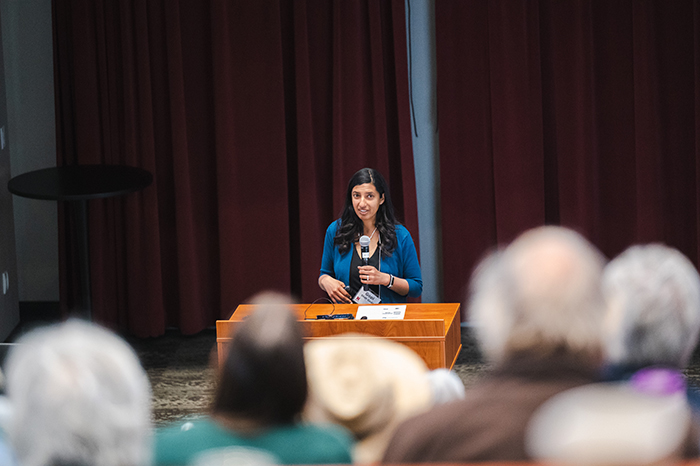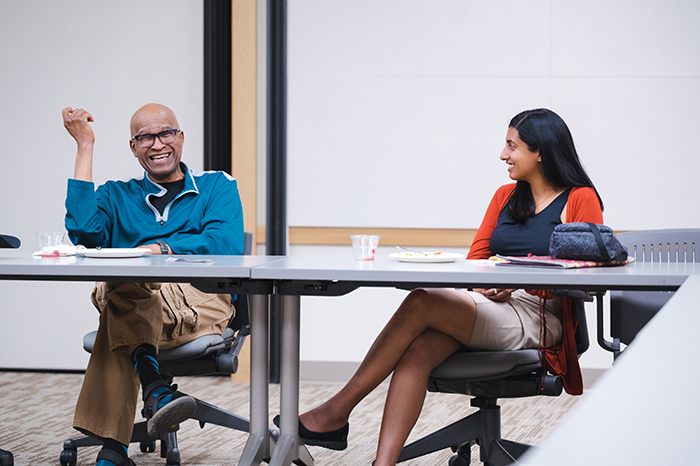Gopi Shah Goda, ’00, flourished in actuarial science at the University of Nebraska–Lincoln, yet lacked clarity on how to bridge her academic knowledge into a career in economic policy decision-making. Working on her honors thesis with Colin Ramsay, Edwin J. Faulkner College Professor of actuarial science, showed Goda how to translate academic research into professional achievement, resulting in a career at the White House as a senior economist.
 Goda, ’00, presented her economic policy research at the university's Innovation Campus in Lincoln, Nebraska.
Goda, ’00, presented her economic policy research at the university's Innovation Campus in Lincoln, Nebraska.
“Dr. Ramsay was a huge influence on me while in the actuarial science program at Nebraska,” said Goda, who graduated with highest distinction while majoring in both actuarial science and mathematics. “He supervised my honors thesis and encouraged me to collaborate on making it a publication. It became my first publication and was the first experience I had with that process.”
That early publication with Ramsay in the North American Actuarial Journal maintains a permanent home on Goda’s curriculum vitae. The process she learned continues to inform Goda’s economic policy research in roles such as working for the Council of Economic Advisers in Washington, D.C.
“Even before Gopi arrived at Nebraska, I was eager to meet her,” said Ramsay, who knew Goda’s father Bipin Shah, then a faculty member in the Nebraska College of Business Department of Finance. “Bipin often talked to me about Gopi and wanted me to mentor her.”
After brief interactions when Goda arrived on campus, she eventually enrolled in one of Ramsay’s upper-level courses. It became a signature connection during her time as an undergraduate.
“I quickly learned Gopi was indeed very special,” said Ramsay. “My classes are often considered 'challenging' by students, but Gopi rose to meet and exceed my challenges. She was not only supremely intelligent and industrious but also kind in spirit. She often helped other students, interacted with diverse students and was a quiet leader.”
Goda’s service to others helps her excel as a senior fellow in her job at Stanford University’s Institute of Economic Policy Research (SIEPR). Although she also worked in business as an actuarial associate early in her career, her accomplishments in economic policy decision-making at Stanford led to her appointment at the White House in 2021-22. In her role with the Council of Economic Advisers, she worked on various policy issues, including health care, child care, labor market recovery and competition policy.
“I found the experience rewarding and fulfilling,” said Goda. “I learned so much about how the policy process works and how research feeds into that policy process. I learned policies that were put in place that I could help build up or research for the Veterans Act.”
 Goda spoke with business students and her academic mentor Colin Ramsay, Edwin J. Faulkner College Professor of actuarial science, about her academic research in economics and how she translated that into a career as a senior economist at the White House.
Goda spoke with business students and her academic mentor Colin Ramsay, Edwin J. Faulkner College Professor of actuarial science, about her academic research in economics and how she translated that into a career as a senior economist at the White House.
Her work grew complex trying to understand trends through the lens of the COVID-19 pandemic. Although the outward effects of the pandemic were easing during her time at the White House, it still colored the economic data from the previous year due to social distancing, employment interruptions and the overburdened medical system, among other factors.
“There were a host of projects monitoring the health of the economy and understanding what indicators were telling us about the economy. Understanding all the indicators painted a picture of how things would evolve going forward and what policies were needed to ensure things would move forward effectively,” she said.
In addition to analyzing the data, Goda found greater responsibility in learning how to best communicate information to non-economists. It brought her back to her time as an undergraduate when she discovered the answer to the problem is not all there is to learning.
“In academia, we spend a lot of time communicating results to other academics. It became clear how important it was to people outside the field and how much more challenging that can be. I came back to the idea of why I entered economics in the first place. As I reflect back on my days at Nebraska, I had to not just communicate the answer, but communicate what that means and how I came up with the answer. I understand better now the value of doing that extra work communicating results,” she explained.
Goda’s work at Stanford, where she also earned a doctorate, helped during her role on the Council of Economic Advisers. Much of her work at SIEPR focuses on the economics of aging to improve the quality of life for the elderly.
“I study the way people make retirement savings and health care decisions as they grow older and how we can make programs that serve the elderly and vulnerable populations more sustainable,” said Goda, who also teaches a course on the economics of aging. “I’m interested in the lasting impacts of the COVID-19 pandemic and engaged in research projects with collaborators from within and outside the university.”
Ramsay looks back over the past 20 years from the time Gopi studied at Nebraska to the professional research and teaching she has dedicated to others. He sees her in a unique light.
“It is extremely rare to find a student who is naturally research-inclined as an undergraduate,” said Ramsay. “The fact Gopi left the corporate world to follow her passion for scholarly research is noteworthy. I am not surprised she chose to pursue economics with the intention of bettering the lives of Americans, especially the less fortunate.”
To learn more about Goda and watch videos of her explaining her research, visit: https://siepr.stanford.edu/news/video-series/bridging-research-and-policy
Published: July 19, 2023